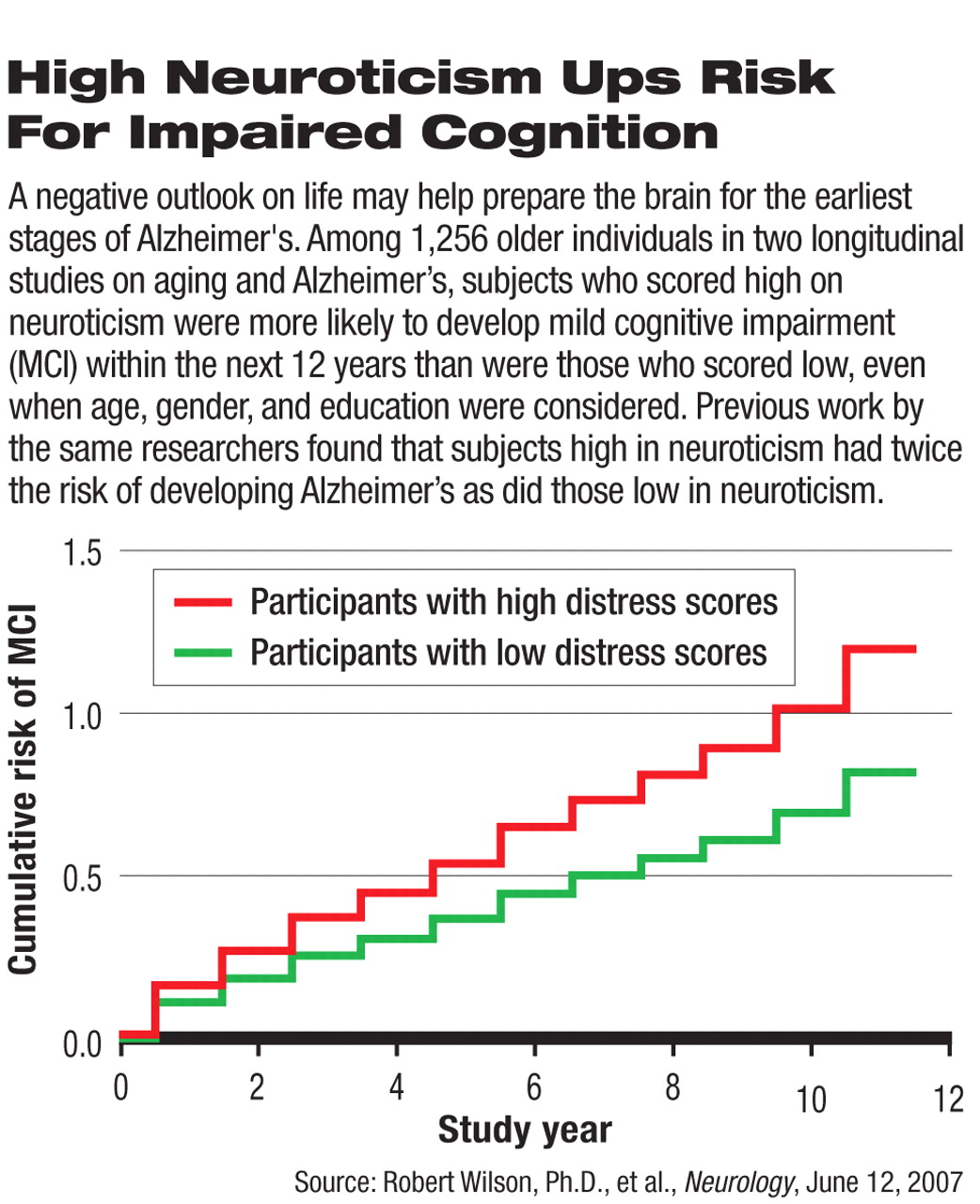Two women reached their 65th birthdays. One said: “Now that I've become eligible for Medicare, it's great because it will save money.” The other, however said: “It's horrible that I now qualify for Medicare.”
Considering their outlooks on life, which woman is more likely to develop Alzheimer's disease? The more negative one, research conducted by Robert Wilson, Ph.D., a professor of neuropsychology at Rush University Medical Center in Chicago, and his colleagues suggests.
Several years ago, Wilson and his colleagues linked having a negative view on life, which they referred to as a “neurotic personality” and or as “an enduring tendency to experience negative emotions,” with the risk of developing Alzheimer's. They wondered whether such an outlook might already be present at the beginning of the disease process—that is, at the start of mild cognitive impairment, which is a mental state preceding full-blown Alzheimer's.
They tested their hypothesis by focusing on 1,256 older individuals who had signed up for two longitudinal studies of aging and Alzheimer's—the Religious Orders Study and the Rush Memory and Aging Project.
The Religious Orders Study, begun in 1994 at Rush and other medical centers, includes older Catholic nuns, priests, and brothers from across the United States. The Rush Memory and Aging Project, which started in 1997, includes older lay persons recruited from continuing-care retirement communities, subsidized-housing facilities, churches, and other sources in the Chicago area.
Upon entry into their respective study, the subjects had been given a neurological examination and cognitive tests to make sure that they did not have mild cognitive impairment. Diagnosis was based on highly structured criteria that had been clinically and pathologically validated. Also upon entry, subjects had been evaluated for neuroticism with the NEO Five-Factor Inventory. Subjects read six statements—for example, “I am a worrier,” “I often feel tense and jittery,” “I often get angry at the way people treat me,” or “I often feel inferior to others”—and rated on a five-point scale (strongly disagree, disagree, neutral, agree, strongly agree) whether each statement applied to them. Scores for each statement were tallied and combined into a final neuroticism score, a higher final score indicating a greater tendency toward neuroticism.
Over the next 12 years, subjects were given annual neurological exams and cognitive tests to determine whether they were developing mild cognitive impairment. By the end of the follow-up period, 482 subjects (38 percent) had developed such impairment. Wilson and his team then assessed whether there was an association between subjects' neuroticism scores upon study entry and whether they developed mild cognitive impairment during the 12-year follow-up.
They did find such a relationship. Subjects who scored high on neuroticism were more likely to develop mild cognitive impairment. For example, a person who had scored very high on the neuroticism scale—that is, had a score of 24 out of a possible 24 and was above the 90th percentile—was 42 percent more likely to develop mild cognitive impairment than was a person who had scored very low on the scale—that is, had a score of 8 out of 24 and was in the 10th percentile.
Also, the results, which are reported in the June 12 Neurology, compared favorably with the researchers' previous ones regarding neuroticism and Alzheimer's—subjects high in neuroticism had twice the risk of developing Alzheimer's as did subjects low in neuroticism.
Moreover, the new results held even when gender and four Alzheimer's risk factors—age, education, depression, and the e4 version of the APOE gene—were considered. Especially intriguing was the finding that controlling for depression did not strongly affect the link between a negative outlook on life and mild cognitive impairment, but controlling for a negative outlook on life almost completely eliminated the link between depression and mild cognitive impairment.
This finding, the researchers noted, “suggests that depressive symptomatology predicts mild cognitive impairment in part because it is a proxy for the enduring tendency to experience negative emotions.”
Just because a negative outlook on life has been linked to mild cognitive impairment, of course, does not prove that the former causes the latter. It is possible that a negative outlook might stem from pathological changes in a brain or be a reaction to having one's brain deteriorate. However, Wilson and his colleagues favor a causal explanation—“that chronic psychological stress somehow compromises limbic structures that regulate stress-related behavior and memory systems. This would account for the selective association observed here and elsewhere between distress proneness and decline in episodic memory which is mediated in part by the hippocampal formation. Also, psychiatric conditions like major depression and post-traumatic stress disorder which involve high levels of psychological distress have been associated with atrophy of the hippocampus and anterior cingulate gyrus.”
Psychiatric News asked Wilson if, on the basis of their findings, adopting a more positive outlook on life might help keep people from developing Alzheimer's. “I do think that being less prone to negative emotions should reduce one's risk of cognitive decline and Alzheimer's,” he said. “This trait is pretty stable in adulthood and old age, however, so changing it may be difficult. But if we can understand the biological mechanism linking distress with dementia and cognitive decline, it may suggest new strategies for delaying the onset of cognitive impairment and dementia in old age.”
The study was funded by the National Institute on Aging and the Illinois Department of Public Health.
An abstract of “Chronic Distress and Incidence of Mild Cognitive Impairment” is posted at<www.neurology.org/cgi/content/abstract/68/24/2085>.▪

